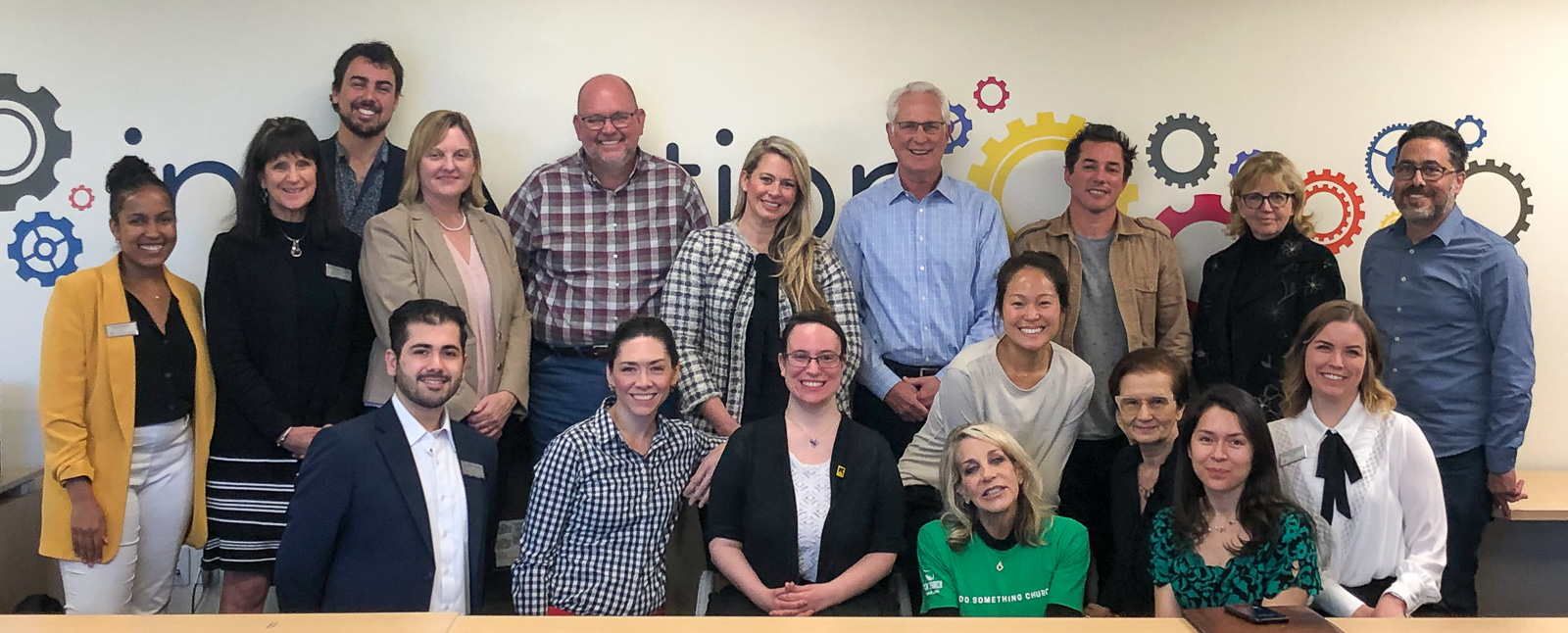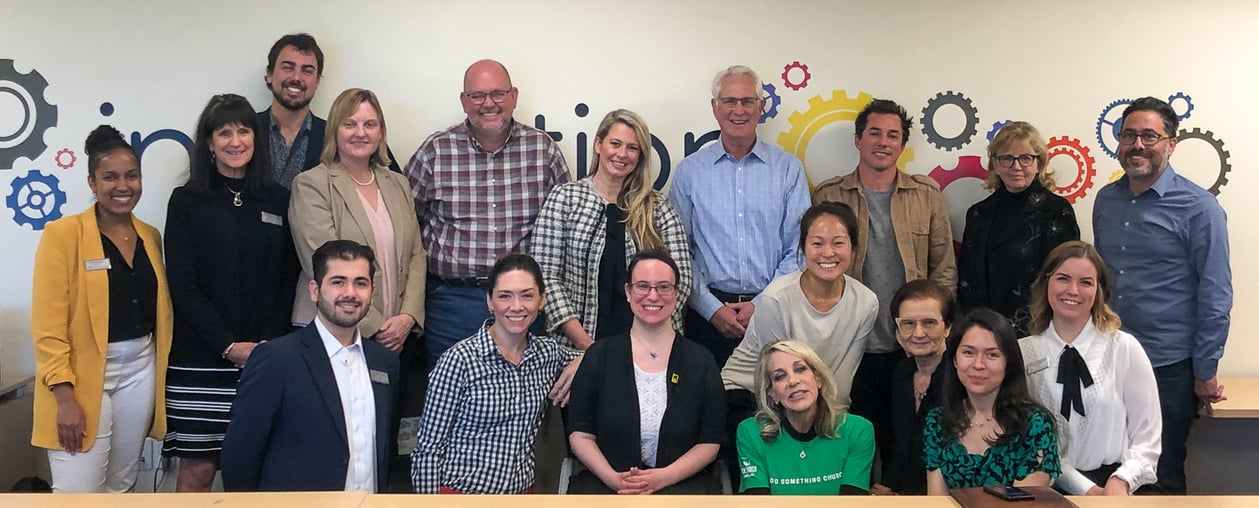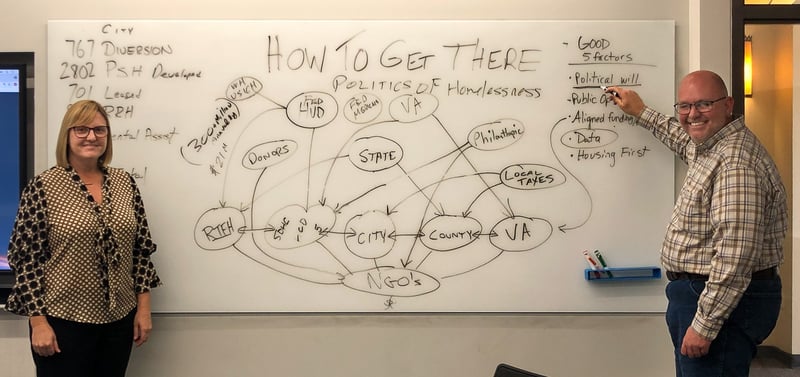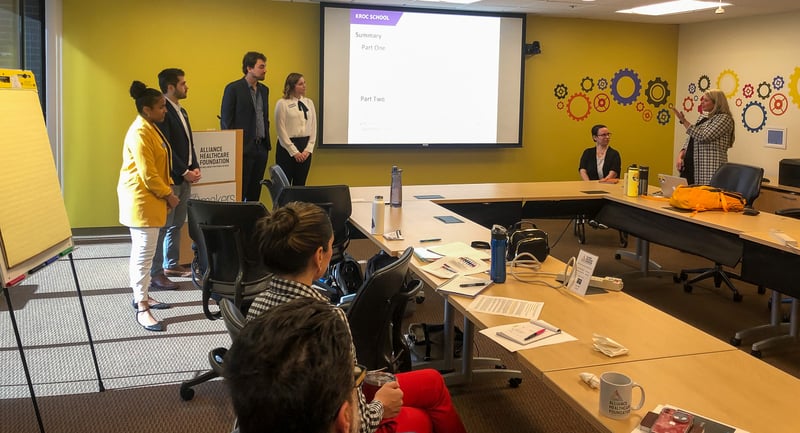Social Innovation Practicum Addresses Issues of Homelessness in the San Diego Region

Social Innovation Practicum Addresses Issues of Homelessness in the San Diego Region
begin quote
The following post was contributed by Professor of Practice Karen Henken.
 Master of Arts in Social Innovation practicum, taught by Professor of Practice Karen Henken, and her students at their final presentation on January 23 with members of the San Diego Funders Together to End Homelessness (FTEHSD) collaborative and other community members including Kroc School Distinguished Professor Necla Tschirgi. Students presenting include: Joseph Ortega, Claire Bergrstresser, Britanny Kirk, Jacob Mandel, Alexandra Steinhaus, Shukri Muhamed.
Master of Arts in Social Innovation practicum, taught by Professor of Practice Karen Henken, and her students at their final presentation on January 23 with members of the San Diego Funders Together to End Homelessness (FTEHSD) collaborative and other community members including Kroc School Distinguished Professor Necla Tschirgi. Students presenting include: Joseph Ortega, Claire Bergrstresser, Britanny Kirk, Jacob Mandel, Alexandra Steinhaus, Shukri Muhamed.
Each January, Master of Arts in Social Innovation (MASI) students work with one or more San Diego nonprofits and/or corporations during the winter consulting practicum. Led by Professor of Practice Karen Henken, students serve as pro bono consultants to that organization, and the organization’s executive team members become their clients — students help the organization address a real problem they are facing.
For the January 2020 consulting practicum, six MASI students partnered with San Diego Grantmakers’ Funders Together to End Homelessness (FTEHSD) to focus on issues of homelessness in the region. San Diego County has the fourth largest homeless population in the United States, and homelessness is a multi-sector, highly complex problem that is becoming an increasing priority for all sectors to address.
FTEHSD provides a unique and innovative approach to addressing homelessness by bringing stakeholders and funders across sectors together in the San Diego region. Their goal is to better understand the challenging issues contributing to homelessness and develop higher impact solutions to homelessness through their collective impact approach.
Working with Amy Denhart, Director of FTEHSD, MASI students dove deep into learning about the many contributing factors to homelessness in order to develop a series of specific recommendations with multi-stakeholder solutions geared towards making a positive impact on homelessness in the region. The project had two key components:
- Identify and understand best practices and innovative solutions in other regions that could be relevant and applicable to San Diego.
- Develop a series of recommendations that could be realistically implemented in San Diego to address homelessness.
Topic Immersion: Understanding Homelessness in San Diego

Amy Denhart and Michael McConnell of FTEHSD illustrating the complexity of the homelessness crisis in the San Diego region.
The winter consulting practicum is a very short, intensive course that is only three weeks in length from start to finish, so there is a tremendous amount of work for students to do to ensure they are able to develop tangible and valuable recommendations for their client. Students spent dozens of hours meeting with and interviewing experts on homelessness across the region and in Los Angeles, doing site visits to shelters and homelessness services providers, interviewing homeless individuals living on the streets, in shelters and more.
One of the most extraordinary outcomes that students experienced in this course was the thoughtfulness, willingness and enthusiasm of San Diego leaders at the highest level in city and county government, nonprofits, businesses and funding organizations to engage with and make themselves available to provide interviews, insights and guidance to support students’ research and analysis. It was truly representative of the importance and urgency of this topic to the region.
Interviews and contacts included Councilmember Chris Ward and his team, Sempra Energy’s Director of Corporate Social Responsibility, and key members of the Funders Together collaborative, LeSar Development, the Mayor’s Office on San Diego Housing Innovation, Father Joe’s Village, Lucky Duck Foundation, Regional Task Force on Homelessness, 2-1-1 San Diego, Brilliant Corners of Los Angeles, United Way of Diego and Los Angeles, PATH, Mission Driven Finance, Alpha Project and more.
Two Key Opportunities Identified: Increasing Business and Military Involvement Students presenting their final recommendations on January 23.
Students presenting their final recommendations on January 23.
Two opportunities that students identified to alleviate homelessness in San Diego were the potential for the San Diego business and military communities to become more involved in solutions and support. As the students looked at best practices in other regions, they saw the power and impact of the business community to create more support, funding and engagement, and to humanize the experience of homelessness for the entire community. Many of the best examples they drew from were from programs in Los Angeles and Seattle.
As much of the San Diego community is primarily comprised of smaller businesses, students offered specific recommendations for how businesses can be engaged at neighborhood levels in volunteerism, advocacy, local support and funding.
In addition, the military represents enormous potential for volunteerism from active duty members and their families as well as support from large defense contractors and service providers. Students further recommended that San Diego's largest defense contractors have significant potential to be more engaged in both funding and providing resources and human capital to support and address the homelessness crisis, especially as homeless veterans represent an issue that touches on the military sector.
Speaking from her personal experience about the potential she sees with the military’s involvement, MASI student Brittany Kirk said, “As the former marketing director of the San Diego Armed Services YMCA for seven years and as a military spouse, I have seen thousands of servicemembers give back to San Diego with skilled labor. I actually met my husband while volunteering at a Girl Scout event with Rotary, and he later went on to complete over 500 service hours to achieve his Navy Volunteer Service Ribbon. Typically, San Diego Navy and Marines are encouraged to volunteer with other Veteran Service Organizations but their passion to serve doesn’t end there. They would be a natural fit of reliable and ongoing volunteer force who could be recruited to help our homeless service nonprofits with safe lot parking assistance, logistics and security, medical corpsman volunteers and food distributions.”
Finally, the students identified the need for far more coordination and centralization of homeless services and advocacy for those experiencing homelessness.
Clients and Students Share Positive Feedback About Their Experience
On January 23, the MASI students presented their insights and recommendations to all members of the Funders Together to End Homelessness collaborative as well as the CEO of San Diego Grantmakers and the CEO of 2-1-1 San Diego. Their presentation was extremely well received and best of all, many aspects of the students’ powerful and creative recommendations will be integrated going forward.
The students worked in two project teams throughout the practicum. They described their experience as follows:
Project Team 1 with Shukri Mohamed, Joseph Ortega and Alexandra Steinhaus serving as team leader stated:
“As a team, we learned more in this project than we ever have in a three-week period! Acting as consultants challenged us to prioritize our research and process information quickly. We presented to experts in the field, so it was crucial we looked at the homelessness crisis from a new angle and brought our understanding of social innovation to the table. As we analyzed this complex issue, we discovered the importance of taking a holistic approach and involving multiple stakeholders in the conversation. Because of this project, we feel deep empathy for and connection to the homelessness experience and hope we can further humanize this problem in our community.”
Project Team 2 with Claire Bergstresser, Jacob Mandel and Brittany Kirk as the team leader stated:
"It was a valuable opportunity to immerse ourselves in the critical issue of homelessness in San Diego. Professor Henken brought changemakers to campus from all over Southern California and students were given the opportunity to do fieldwork to better inform our recommendations. Our group interviewed 25 nonprofit, county, city and religious leaders in a span of three weeks. We toured and volunteered at Father Joe's Villages. I had the opportunity to interview a wide cross-section of San Diegans, which included landlords, Harbor Police, librarians, 2-1-1 and representatives from City Councilmember Chris Ward's office. It was a three-week intensive process, but I came away with deeper knowledge about a complicated issue, along with contacts for life and a deeper empathy and understanding of how to assist my homeless neighbors in North Park. I was humbled by the packed board room at Funders Together who came to hear our recommendations, where I was able to utilize my marketing background. Each of our team members brought their own unique perspective based on their backgrounds in military nonprofits, the International Rescue Committee and political campaigns to inform our recommendations. At the end of January, our enthusiasm and camaraderie to advance "Housing First, then Services" here in San Diego culminated in a shared dinner at Professor Henken's with our program mentors."
Amy Denhart, Director of Funders Together to End Homelessness, shared her thoughts on the project:
“We are so grateful for and impressed by the work that the MASI students did for us. In just three weeks, these talented students learned about the complex causes and solutions to homelessness. They used their knowledge to make thoughtful, evidence-based recommendations for improving the system and ending homelessness. Funders Together is now moving forward to put the MASI students’ recommendations into practice. “
Ray Ellis, Chairman of The Parker Foundation, and members of FTEHSD attended the final presentation and sent this message afterward to Professor of Practice Karen Henken:
“Thanks for the great presentation from you and your team. Very impressive and informative. It's very helpful to get a fresh set of eyes and perspective on this complex topic. I can't wait to share the PowerPoint with my colleagues at The Parker Foundation. Please share my thanks with all your students. They give me great optimism about the future.”
We are deeply grateful for the support of Amy Denhart, San Diego Grantmakers, the entire Funders Together to End Homelessness collaborative team, especially Michael McConnell, homeless advocate and Kris Kuntz of LeSar Development as well as countless other regional leaders and experts who helped make this experience and the outcomes of this project so profound and effective.
At the Kroc School, we are educating for peace and social innovation. Ready to join us? Learn more about the Kroc School's Master of Arts in Social Innovation.
Contact:
Justin Prugh
jprugh@sandiego.edu
(619) 260-7573

About the Author
The Joan B. Kroc School of Peace Studies (Kroc School) at the University of San Diego is the global hub for peacebuilding and social innovation. Founded in 2007, the Kroc School equips the next generation of innovative changemakers to shape more peaceful and just societies. We offer master's degrees in peace and justice, social innovation, humanitarian action, conflict management and resolution, and a dual degree in peace and law — programs that have attracted diverse and dynamic students from more than 50 countries. In addition to our graduate programs, the Kroc School is home to the Kroc Institute for Peace and Justice (Kroc IPJ). Founded in 2001, the Institute supports positive change beyond the classroom. Through groundbreaking research, experiential learning, and forward-thinking programs, the Kroc School and Kroc IPJ are shaping a future in which peaceful co-existence is the new normal.





